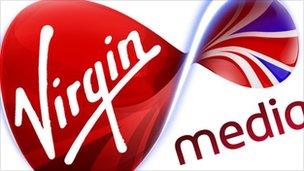Virgin Media to double the speed of customer broadband
- Published

Bandwidth allowance will be doubled in accordance with the speed increase, Virgin Media said
Virgin Media will double the speed of its broadband service for more than four million of its customers, the company has said.
The upgrade, which begins in February, will also see the service's top speed increase from 100Mbps to 120Mbps.
The full rollout is expected to be complete by mid-2013 at a cost to the company of £110m.
The Prime Minister, David Cameron, said the investment would be a "great boost" to the UK.
"I welcome this announcement from Virgin Media," Mr Cameron said in a statement.
"It will provide a great boost for the economy and change the way many households, consumers and businesses use the internet.
"Rolling out superfast broadband across the country is a critical part of our plan to upgrade the UK's infrastructure and build a new and smarter economy."
The government has set targets to improve the UK's broadband speeds considerably in the next three years.
Virgin Media's chief executive Neil Berkett said: "The internet has become an integral part of our social, work and family lives, so we think our customers are going to love this.
"As people are increasingly doing more online, and getting connected to the internet with lots of different devices, having a fast, reliable broadband service should not be a luxury.
"We want to make sure that consumers have access to the best value broadband service and that means a superfast connection."
BT announced it was investing £2.5bn to make fibre broadband available to two-thirds of UK premises by the end of 2015.
It has since invested a further £300m to bring that target forward to the end of 2014.
It promised significant improvements to most homes, while even faster broadband - around 300Mbps - will become available in a limited number of "superfast" areas.
In response to Virgin Media's plans, BT said: "It is no surprise to see that Virgin are following our lead by doubling speeds.
"We announced we would do this for our fibre products last autumn and so they are trying to catch up with us."
BT's fastest available speed to the majority of its customers is currently 40Mbps.
Free of charge
Virgin Media's upgrade will mean customers currently signed up for 10Mbps will be boosted to 20Mbps, while users on 20Mbps and 30Mbps packages will both be upped to 60Mbps.
Those on 50Mbps will be increased to 100Mbps. Customers already on the top 100Mbps tariff will be raised to 120Mbps - the fastest speed Virgin Media is currently able to provide.
The company said bandwidth usage limits will also be doubled to accommodate the increased speed.
Most customers will not notice the upgrades taking place, nor will any have to pay for the changes to take place, a spokesman said.
However, some users with old modems and other similar hardware will receive new up-to-date equipment free of charge.
Fernando Elizalde, a principal analyst from Gartner who specialises in consumer broadband, said he believed Virgin Media's investment in expanding its broadband capability was sound.
"In the last year and a half, multiple connections in the home and online video have caught up so much that it justifies having this high amount of bandwidth," he told the BBC.
"But there is still the question about rural areas. Virgin still cover mostly urban areas - they don't reach as many people in rural areas as BT and other telecoms providers."
According to Ookla, a company which uses monitors broadband speed tests across the world, the UK ranks around 35th globally when ranked by broadband consumer download speed - an average of 11.65Mbps.
Virgin Media say that when the rollout is complete, that average could rise to around 16.46Mbps.
Based on Ookla's research, which gathers data from millions of speed tests, the increase would rank UK the 19th-fastest globally when compared to today's standards.
'Competitive advantage'
The BBC's media correspondent Torin Douglas said the service improvement will come at an opportune time as more bandwidth-heavy services like Lovefilm and Netflix, which launched this week in the UK, begin to start attracting larger numbers.
"It means their subscribers can get their television, movies and songs even more quickly than they could before, which is obviously good news," he said.

BT is investing in upgrading the UK's ageing and slow copper infrastructure
"But Virgin still hasn't managed to convince the majority of consumers that their system is better than broadband that comes down the telephone line.
"Until they do, they won't be able to establish a real competitive advantage."
Andrew Ferguson, of independent broadband review site thinkbroadband.com added: "The news is good for UK broadband as a whole and should highlight that the UK is not the internet backwater sometimes it is portrayed as.
"It means that around a quarter of Virgin Media customers will be meeting the basic speed requirement of 30 Meg which is an EU target for 2020, many years ahead of time."
- Published5 October 2011
- Published29 June 2011